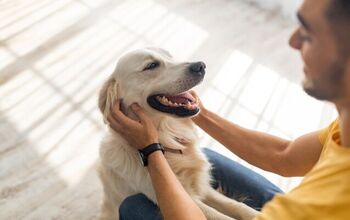Can Dogs Be Allergic to Pollen?

It’s that time of the year, when the trees and flowers are in bloom, and the pollen is all over the place. And since a lot of people have pollen allergies, this idyllic picture results in a whole lot of sneezing, eye-watering, and all sorts of other irritating issues. But what about dogs? Can our four-legged friends be allergic to pollen as well? Let’s delve deeper to fully understand the effects of pollen on dogs.
Pollen Allergy in Dogs: Causes, Symptoms, and Treatment(s)
Believe it or not, dogs can be allergic to pollen, just like humans. This condition is known as canine pollen allergy or canine hay fever. Pollen is a common environmental allergen that can trigger potent reactions in some dogs. When dogs with pollen allergies come into contact with pollen, they may experience a range of symptoms. Knowing the symptoms can help you understand if your pet has a reaction to pollen. Here are the main ones.
- Itching:
Itchiness is one of the first symptoms of pollen allergies. In an attempt to reduce the effects of the pollen, dogs may scratch, bite, lick, or chew at their skin, paws, ears, or other areas. If you notice this, then a pollen allergy could be the case at hand.
- Redness and Inflammation:
Allergic reactions can lead to red, inflamed skin, particularly in areas that come into direct contact with pollen. This can be hard to notice on dogs with thick coats. But if you do notice it, be sure to consult with your vet.
- Sneezing and Runny Nose:
Some dogs may exhibit symptoms similar to those of human hay fever, including sneezing, a runny nose, and watery eyes. Some sneezing can be normal, but you will definitely know when the sneezing becomes too frequent.
- Paw Chewing and Licking:
Dogs may excessively chew or lick their paws, which can lead to irritation and secondary infections.
- Ear Infections:
Pollen allergies can contribute to ear inflammation and ear infections in some dogs. This issue can be more prevalent in certain breeds such as Bassets, because of the shape of their ears.
- Hair Loss:
Excessive scratching and licking can lead to hair loss and hot spots. If you notice bald spots or clumps of hair, contact your vet!
If you suspect your dog has a pollen allergy, it's important to consult a veterinarian. They can perform allergy testing to identify the specific allergens that are causing the reaction and recommend appropriate treatment options. Treatment may include antihistamines, corticosteroids, medicated shampoos, allergy shots (immunotherapy), and environmental management strategies to reduce exposure to pollen.
In case the symptoms of the allergy are mild, you can also try – after consulting your vet – some of the many natural or over-the-counter remedies for dog allergies. For example, these Pet Chef allergy relief chews are a great choice for dogs with hair and skin issues as a result of their pollen allergy as they will soothe itching and help maintain a healthy coat. Made from natural ingredients, these PB-flavored chews can be doled out as a treat, which is perfect if you have a picky eater on your hands.
And if the itching gets bad and results in hair loss, you should ask for a green light from your vet to ramp things up and offer relief with medicated Veterinary Formula itch relief shampoo. When there’s an itch, nothing helps better than a relaxing and relieving bath, especially when the shampoo contains lidocaine for analgesic properties, hydrocortisone to reduce inflammation, and colloidal oatmeal for an instant soothing effect on irritated skin.
In addition to trying out various treatment options, you should also steer clear of spots that could trigger your pet’s allergies or make them worse. Keep in mind that pollen levels can vary by season and location, so your dog's symptoms may be more pronounced during certain times of the year or in specific geographic areas. If you know that a certain area you frequent with your pet has a big concentration of pollen, then by all means, try to avoid it. Choose areas that have fewer flowers and trees, and try to plan your walking routes ahead.

A proud mama to seven dogs and ten cats, Angela spends her days writing for her fellow pet parents and pampering her furballs, all of whom are rescues. When she's not gushing over her adorable cats or playing with her dogs, she can be found curled up with a good fantasy book.
More by Angela Vuckovic

























